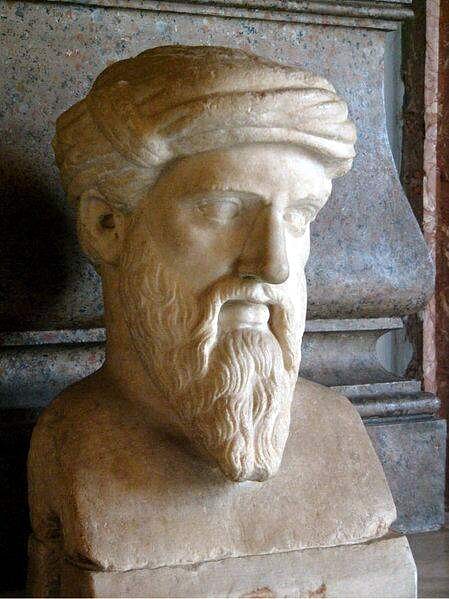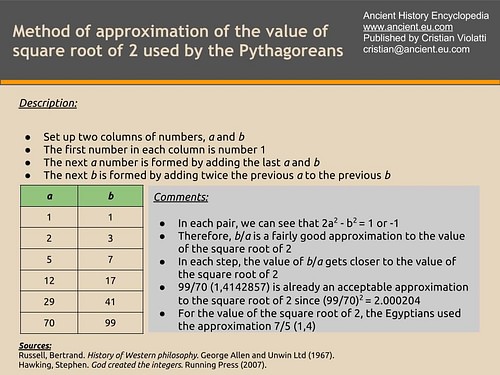
Pythagoras (l.c. 571 to c. 497 BCE) was a Greek philosopher whose teachings emphasized the immortality and transmigration of the soul (reincarnation), virtuous, humane behavior toward all living things, and the concept of "number" as truth in that mathematics not only cleared the mind but allowed for an objective comprehension of reality.
He is best known in the modern day for the Pythagorean Theorem, a mathematical formula which states that the square of the hypotenuse of a right triangle is equal to the sum of the squares on the other two sides. This formula has been applied to measuring distance and space as, for example, in planning and executing the construction of a building. Although attributed to Pythagoras by ancient writers, modern scholars cite evidence from Babylonian texts, written some time before Pythagoras, which discuss the same formula or, at least, one very similar.
Almost nothing is known of Pythagoras' life even though later writers (such as Diogenes Laertius, l. c. 180-240 CE) attempted to put together biographies based on stories and fragments from earlier works. Laertius' biography of Pythagoras is the most complete but, unfortunately, the author never cites the sources he drew from and so it is impossible to corroborate many of his claims.
Pythagoras' influence on later philosophers, and the development of Greek philosophy generally, was enormous. Plato (l. c. 428/427-348/347 BCE) references Pythagoras in a number of his works and Pythagorean thought, as understood and relayed by other ancient writers, is the underlying form of Plato's philosophy. Plato's famous student Aristotle (l. 384-322 BCE) also incorporated Pythagorean teachings into his own thought and Aristotle's works would influence philosophers, poets, and theologians (among many others) from his time through the Middle Ages (c. 476-1500 CE) and into the modern day. Although Pythagoras remains a mysterious figure in antiquity, therefore, he also stands as one of the most significant in the development of philosophical and religious thought.
Life & Works
What is known of Pythagoras comes from later writers piecing together fragments of his life from contemporaries and students. It is known that Pythagoras was born on the island of Samos, off Asia Minor, where his ancestors had settled after leaving Phlius, a city in the northwest Peloponnese, after the civil war there in 380 BCE. He received a quality education as his father, Mnesarchus, was a wealthy merchant. He may have studied in Babylon and in Egypt and possibly had the best Greek tutors of the time. All of this is speculative, however, as the information comes from later writers who accepted, uncritically, what others wrote about him. If there was an authoritative biography of Pythagoras, or original works by the man himself, they are long lost. Scholar Forrest E. Baird comments:
Pythagoras was associated with so many legends that few scholars dare to say much about his life, his personality, or even his teachings, without adding that we cannot be sure our information is accurate. That there was a man named Pythagoras who founded the sect called the Pythagoreans, we need not doubt; among the witnesses to his historicity was his younger contemporary Heraclitus, who thought ill of him. Nevertheless, it is notoriously difficult to distinguish between the teachings of Pythagoras himself and those of his followers, the Pythagoreans. (14)
The historicity of Pythagoras has never been questioned. Heraclitus (l. c. 500 BCE), as Baird notes, considered Pythagoras highly overrated and another contemporary, the visionary Xenophanes of Colophon (l. c. 570 to c. 478 BCE), mocked Pythagoras for his belief in reincarnation. The difficulty in any discussion of Pythagoras is in trying to separate the actual man and his teachings from the mythology which surrounded him even in his own lifetime.
Pythagorean Beliefs
As noted, none of Pythagoras' writings – if he wrote anything – have survived and, owing to the secrecy he demanded of his students, the specifics of his teachings were carefully kept. The philosopher Porphyry (l. c. 234 to c. 305 CE), who wrote a later biography of Pythagoras, noted:
What he taught his disciples no one can say for certain, for they maintained a remarkable silence. All the same, the following became generally known. First, he said that the soul is immortal; second, that it migrates into other kinds of animals; third, that the same events are repeated in cycles, nothing being new in the strict sense; and finally, that all things with souls should be regarded as akin. Pythagoras seems to have been the first to introduce these beliefs to Greece. (Robinson, 58)
The Greek historian Herodotus (l.c. 484 to c. 425/413 BCE) alludes to Pythagoras (though famously refuses to name him) in his Histories:
Moreover, the Egyptians are the first to have maintained the doctrine that the soul of man is immortal and that, when the body perishes, it enters into another animal that is being born at the same time, and when it has been the complete round of the creatures of the dry land and of the sea and of the air it enters again into the body of a man at birth; and its cycle is completed in three thousand years. There are some Greeks who have adopted this doctrine, some in former times and some in later, as if it were their own invention; their names I know but refrain from writing down. (Book II.123)
Like the Pythagorean Theorem, Pythagoras' concept of the transmigration of souls may also have been borrowed. Scholar George G. M. James, in his work Stolen Legacy: The Egyptian Origins of Western Philosophy, points out that all of the great Pre-Socratic philosophers either studied in Egypt or in the Egyptian Mystery Schools of Asia Minor (James, 9). Thales (l.c. 585 BCE), considered the first Western philosopher, studied in Babylon and two other of the most significant Pre-Socratics – Anaximander (l. c. 610 to c.546 BCE) and Anaximenes (l. c. 546 BCE) – both traveled extensively and had access to the Mystery Schools which focused on Egyptian religious thought.
It is more than likely, then, that Pythagoras' thought was actually Egyptian spirituality transplanted to Greece. Pythagoras' famous secrecy may have been intended to keep this fact from circulating too widely and discrediting him as an original thinker. He is said to have been quite charismatic and a powerful public speaker and it would have undermined his authority if his philosophy was revealed as simply re-packaged Egyptian belief.
Whether he concealed his teachings for this reason or some other cannot be ascertained. It is possible he simply felt the masses would not understand or appreciate his ideas. Whatever the reason, the secrecy added greatly to his mystique and reputation. His belief in the immortality of the soul and reincarnation led naturally to a vegetarian lifestyle with an emphasis on doing no harm to any other living thing and this asceticism, which he also demanded of his followers, elevated his reputation as a holy man even further. Diogenes Laertius describes his diet and habits:
Some say that he was satisfied with honey alone or a bit of honeycomb or bread (he did not touch wine during the day); or, for a treat, vegetables boiled or raw. Seafood he ate but rarely. His robe, which was white and spotless, and his bedclothes, which were also white, were of wool; for linen had not yet reached those parts. He was never observed to relieve himself, or to have intercourse, or to be drunk. He used to avoid laughter and all pandering to scurrilous jokes and vulgar stories. (VIII.19)
Laertius describes Pythagoras as a pescatarian, eating fish and seafood, but most other ancient authors maintain he was a strict vegetarian abstaining from the meat of any living thing which could be regarded as having a soul. He likewise abstained from sex and remained celibate to maintain spiritual power and clarity of thought. In disengaging from worldly pleasures such as sex and food, he freed himself from the distractions of the body to focus on the improvement of the soul.
This asceticism was thought by some to go too far. He and his followers were known to especially abstain from eating, or even touching, beans (one account of his death, in fact, claims that he would not enter a bean field to escape pursuers and so was killed). Laertius also mentions Xenophanes' satirical criticism of Pythagoras' belief in the transmigration of souls:
Once, they say, that he [Pythagoras] was passing by when a puppy was being whipped, and he took pity and said, `Stop! Do not beat it! For it is the soul of a friend that I recognized when I heard it giving tongue. (VIII.36)
To Xenophanes, who rejected reincarnation, Pythagoras' beliefs were as foolish as claiming one could recognize a departed friend's voice in the bark of a dog. To Pythagoras, however, vegetarianism, pacifism, and humane treatment of other living things were all part of the path to inner peace and, by extension, world peace in that humans could never live in harmony as long as they killed, ate, and were cruel to animals. Poor treatment of animals, and eating animal flesh, devalued all life by maintaining that some creatures (humans) were worth more in life than others. Pythagoras believed that all creatures were created equal and should be treated with respect.
He was considered by contemporaries and later writers as a mystic – not a mathematician as he is sometimes defined in the present day – and his school was associated with spiritual salvation and miraculous revelation. A central belief, which would significantly influence Plato, was that philosophic inquiry was vital to the salvation of the soul and apprehension of ultimate truth. An aspect of that truth was that nothing ever significantly changed and all was eternal and eternally recurring. According to the ancient writer, and student of Aristotle's, Eudemus of Rhodes (l. c. 370 to c. 300 BCE), Pythagoras believed in eternal recurrence as a logical, mathematical necessity. Eudemus writes:
If one were to believe the Pythagoreans, that events recur in an arithmetical cycle, and that I shall be talking to you again sitting just as you are now, with this pointer in my hand, and that everything else will be just as it is now, then it is plausible to suppose that the time, too, will be the same as now. (Baird, 16)
In this belief, Pythagoras prefigures the great German philosopher Fredrich Nietzsche (l. 1844-1900 CE) and his Theory of Eternal Recurrence in which Nietzsche claims that, in the absence of the "finish line" of a God who renders judgment after death, one's life will automatically reset and repeat itself in precisely the same way. Nietzsche's theory has often been interpreted as an encouragement to carefully consider how one spends one's time since one will have to relive every event, large or small, eternally; this may have also been suggested by Pythagoras' teachings.

Even if Pythagoras himself did not frame the concept in this way, he must have articulated it somehow for later Pythagoreans to have repeated it. The concept of the cyclical nature of life and the immortality of the soul were at the heart of Pythagorean thought and influenced many writers and thinkers of ancient Greece but none as significant as Plato.
Pythagoras & Plato
It is possible that Plato began as a student of Socrates, adhering to dialectic in establishing truth, and then only gradually moved toward embracing the idealism of Pythagoras – as some scholars have claimed – but it seems more probable that Socrates himself was aligned with Pythagorean thought. There is really no way of establishing any claim along these lines since most of what we know of Socrates comes from Plato's Dialogues which were written after Socrates' death when Plato was already of a mature philosophical mind.
However he was introduced to it, Pythagorean thought significantly influenced Plato's philosophy which included the concept of an ultimate truth not subject to opinion, of an ethical way of living in line with that truth, the soul's immortality, the necessity of salvation through philosophy, and of learning-as-recollection. Pythagorean concepts are apparent throughout Plato's work but most notably in the dialogues of the Meno and Phaedo.
In the Meno, Plato's main character Socrates shows how what one calls "learning" is actually only "remembering" lessons from a past life. He proves his claim by having a young, uneducated slave solve a geometrical problem. Plato argues that, if one dies with one's mind intact, one will 'remember' what one learned during that life when one is born into the next. What one thinks one 'learns' in this life, one is actually only 'remembering' from one's past life and what one knew in that past life was remembered from a previous one.
Plato never addresses the obvious problem with this theory: at some point, the soul must have had to actually "learn" and not just "remember". His claim that one "remembers" what one learned in the ether in between lives – not just in mortal form – does not address the concern because the soul still would need to "learn" at some point, whether in the body or out of it.
Pythagoras' assertion that "things are numbers" and that one could understand the physical world through mathematics also features in the Meno, not only through Socrates' interaction with the slave but through his argument that virtue is a singular quality inherent in all people, regardless of their age, sex, or social status, in the same way that "number" informs and defines the known world; one recognizes reality through a distinction between unity and duality.
This claim would go toward the development of Plato's famous Theory of Forms in which he describes an objective world of Truth, above the mortal realm, which underlies and informs all human truths and gives them their value of "truthfulness". Without this Realm of Forms, Plato argued, there could be no actual truth, only opinion about what one felt was true.
To Pythagoras, mathematics was the path toward enlightenment and understanding and, as he claimed, "Ten is the very nature of number", and by this 'number' he meant not only a unit of measurement but a means by which the world could be grasped and understood. He noted how people can count up to ten on their fingers and, having reached ten, revert back to the one-unit and begin again. In the same way, a soul entered a body, lived for a certain time, died, and reverted back to where it started from, only to then travel the same path again.
This concept is explored fully in Plato's Phaedo, the account of Socrates' last day in prison before his execution, which focuses on the immortality of the soul and the afterlife. Right from the start of the dialogue, Plato makes use of Pythagoras' link to Phlius, in choosing Echecrates of Phlius as interlocutor and audience to Phaedo, the narrator. Further, the characters of Simmias and Cebes of Thebes – Socrates' central interlocutors in the account Phaedo relates – are both Pythagoreans. Plato's choice of Echecrates links the dialogue directly to Pythagorean thought from the first line but, through Simmias and Cebes, Pythagorean concepts are introduced and developed throughout.
Toward the end of the dialogue, after various proofs have been given by Socrates for the immortality of the soul, he concludes with this exchange with Cebes:
Tell me, [Socrates said], what is that which must be in the body to make it alive?
A soul, [Cebes] replied.
And is this always so?
Of course, [Cebes] said.
Then the soul always brings life to whatever contains her?
No doubt, [Cebes] answered.
And is there an opposite to life or not?
Yes.
What is it?
Death.
And we have already agreed that the soul cannot ever receive the opposite of what she brings?”
Yes, certainly we have, said Cebes.
…
What do we call that which does not admit death?
The immortal, [Cebes] said.
And the soul does not admit death?
No.
Then soul is immortal?
It is.
Good, [Socrates] said. Shall we say that this is proved? What do you think?
(Phaedo, 105c-e)
The mathematical proofs Socrates offers earlier concerning even and uneven numbers finally leads to the above proof that "even" cannot admit of the "odd" in order to remain itself (even) and so life (the soul) cannot admit of death and still remain life; therefore, the soul must be immortal. This entire argument typifies Pythagorean thought as understood by ancient writers and practiced by Pythagorean sects of Plato's time.
Conclusion
The Phaedo also establishes the geography of the afterlife which would later be used by the Church in creating the concepts of Hell, Purgatory, and Heaven. The concept of purgatory first appears in Phaedo 108b-d, judgment of the dead in 113d-e, Hell in 113e-114a, and Heaven in 109d-110b. Plato's argument for an ultimate, undeniable realm of truth, from which all other truths are established, is also evident in the gospel narratives of the Bible, most notably the Gospel of John, and in the epistles of St. Paul
Even though nothing can be said for certain regarding Pythagoras' life or original teachings, enough of his thought was developed by later disciples and admirers to have influenced the greatest Greek philosopher of antiquity. Plato's work established the discipline of philosophy and has permeated every other, to greater or lesser degrees, for the past 2,000 years. The details of Pythagoras' life may never be fully known but his influence continues to be felt, world-wide, in the present day.







